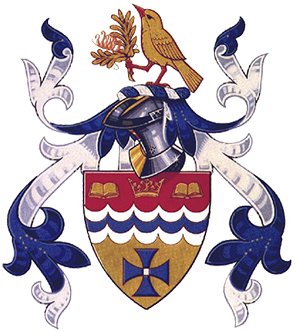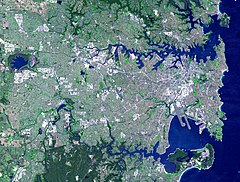The National Institute of Arthritis and Musculoskeletal and Skin Diseases (NIAMS) is one of the institutes and centers that make up the National Institutes of Health, an agency of the United States Department of Health and Human Services (HHS).
The University of Texas Southwestern Medical Center is a public academic health science center in Dallas, Texas. With approximately 23,000 employees, more than 3,000 full-time faculty, and nearly 4 million outpatient visits per year, UT Southwestern is the largest medical school in the University of Texas System and the State of Texas.

The Royal Prince Alfred Hospital is a large teaching hospital in Sydney, Australia, located on Missenden Road in Camperdown. It is a teaching hospital of the Central Clinical School of the Sydney Medical School at the University of Sydney and is situated in proximity to the Blackburn Building of the university's main campus. RPAH is the largest hospital in the Sydney Local Health District, with approximately 1200 beds. Following a $350 million redevelopment, the perinatal hospital King George V Memorial Hospital has been incorporated into it.

The Temerty Faculty of Medicine is the medical school of the University of Toronto. Founded in 1843, the faculty is based in Downtown Toronto and is one of Canada's oldest institutions of medical studies, being known for the discovery of insulin, stem cells and the site of the first single and double lung transplants in the world.

WEHI, previously known as the Walter and Eliza Hall Institute of Medical Research, and as the Walter and Eliza Hall Institute, is Australia's oldest medical research institute. Sir Frank Macfarlane Burnet, who won the Nobel Prize in 1960 for his work in immunology, was director from 1944 to 1965. Burnet developed the ideas of clonal selection and acquired immune tolerance. Later, Professor Donald Metcalf discovered and characterised colony-stimulating factors. As of 2015, the institute hosted more than 750 researchers who work to understand, prevent and treat diseases including blood, breast and ovarian cancers; inflammatory diseases (autoimmunity) such as rheumatoid arthritis, type 1 diabetes and coeliac disease; and infectious diseases such as malaria, HIV and hepatitis B and C.

The Royal North Shore Hospital (RNSH) is a major public teaching hospital in Sydney, Australia, located in St Leonards. It serves as a teaching hospital for Sydney Medical School at the University of Sydney, University of Technology and Australian Catholic University and has over 600 beds.
SA Pathology,, is an organisation providing diagnostic and clinical pathology services throughout South Australia for the public health sector. The headquarters are in Frome Road, Adelaide, and it has many patient collection centres and numerous laboratories located throughout South Australia.

The Cambridge Biomedical Campus is the largest centre of medical research and health science in Europe. The site is located at the southern end of Hills Road in Cambridge, England.
North Carolina State University College of Veterinary Medicine is an American educational institution located in Raleigh, North Carolina that offers master's and doctorate-level degree programs; interdisciplinary research in a range of veterinary and comparative medicine topics through centers, institutes, programs and laboratories; and external engagement through public service programs and activities.
Marilyn Gist Farquhar was a pathologist and cellular biologist, Professor of Cellular and Molecular Medicine and Pathology, as well as the chair of the Department of Cellular and Molecular Medicine at the University of California, San Diego School of Medicine, who previously worked at Yale University from 1973 to 1990. She has won the E. B. Wilson Medal and the FASEB Excellence in Science Award. She was married to Nobel Laureate George Emil Palade from 1970 to his death in 2008. Her research focuses on control of intracellular membrane traffic and the molecular pathogenesis of auto immune kidney diseases. She has yielded a number of discoveries in basic biomedical research including: mechanisms of kidney disease, organization of functions that attach cells to one another, and mechanisms of secretions.

The State University of New York Upstate Medical University is a public medical school in Syracuse, New York. Founded in 1834, Upstate is the 15th oldest medical school in the United States and is the only medical school in Central New York. The university is part of the State University of New York (SUNY) system.

The Institute of Medical Science is an ancillary establishment of Tokyo University. It succeeded the Institute of Infectious Diseases established in 1892 and is the foremost institute for medical and bioscience research in Japan.
The Pennington Biomedical Research Center is a health science-focused research center in Baton Rouge, Louisiana. It is part of the Louisiana State University System and conducts clinical, basic, and population science research. It is the largest academically-based nutrition research center in the world, with the greatest number of obesity researchers on faculty. The center's over 500 employees occupy several buildings on the 222-acre (0.90 km2) campus. The center was designed by the Baton Rouge architect John Desmond.

Eva Lucille Feldman, M.D., Ph.D., F.A.A.N., F.A.N.A. is an American physician-scientist and one of the world’s leading authorities on neurodegenerative disease. Currently, she serves as the Russell N. DeJong Professor of Neurology at the University of Michigan, as well as Director of the NeuroNetwork for Emerging Therapies and ALS Center of Excellence at Michigan Medicine. She was also recently named the James W. Albers Distinguished University Professor of Neurology, the highest faculty honor at the university.

Children's Hospital Oakland Research Institute (CHORI) is a biomedical research institute affiliated with California’s pediatric medical center, UCSF Benioff Children's Hospital Oakland.

The Charles Perkins Centre (CPC) is an Australian medical research institute, clinic and education hub that primarily focuses on diabetes, cardiovascular disease and obesity, as well as other related conditions. The centre is affiliated with the University of Sydney and is located within the Royal Prince Alfred Hospital health precinct at the Camperdown campus of the university in Sydney, New South Wales. The centre is named in honour of alumnus Charles Perkins, the first man of Aboriginal descent to graduate from an Australian university. The centre's academic director is Professor Stephen Simpson.

The Translational Research Institute (TRI) is Australia's first translational medical research institute dedicated to translating scientific discoveries into applications for medical practice.

Leslie "Les" Lazarus was an Australian endocrinologist who was one of the first co-Directors of the Garvan Institute of Medical Research, Sydney from 1966 to 1969 and sole Director from 1969 to 1990. At the Garvan Institute he led a joint laboratory and clinical research team studying diabetes and pituitary hormone secretions, in particular the secretion and clinical uses of human growth hormone.
Carolyn Mary Sue is an Australian physician-scientist, professor and research director. She has been the Executive Director of the Kolling Institute of Medical Research since 2019 and is also Director of Neurogenetics at Royal North Shore Hospital, Director of the Centre of Excellence for Parkinson's Disease and Movement Disorders, and Director of the National Centre for Adult Stem Cell Research. Sue specialises in complex neurogenetic conditions and runs tertiary referral clinics for patients with diseases such as Parkinson's, mitochondrial diseases, and other inherited movement disorders. Her research has identified several previously-unknown mutations that cause neurogenetic disease.













